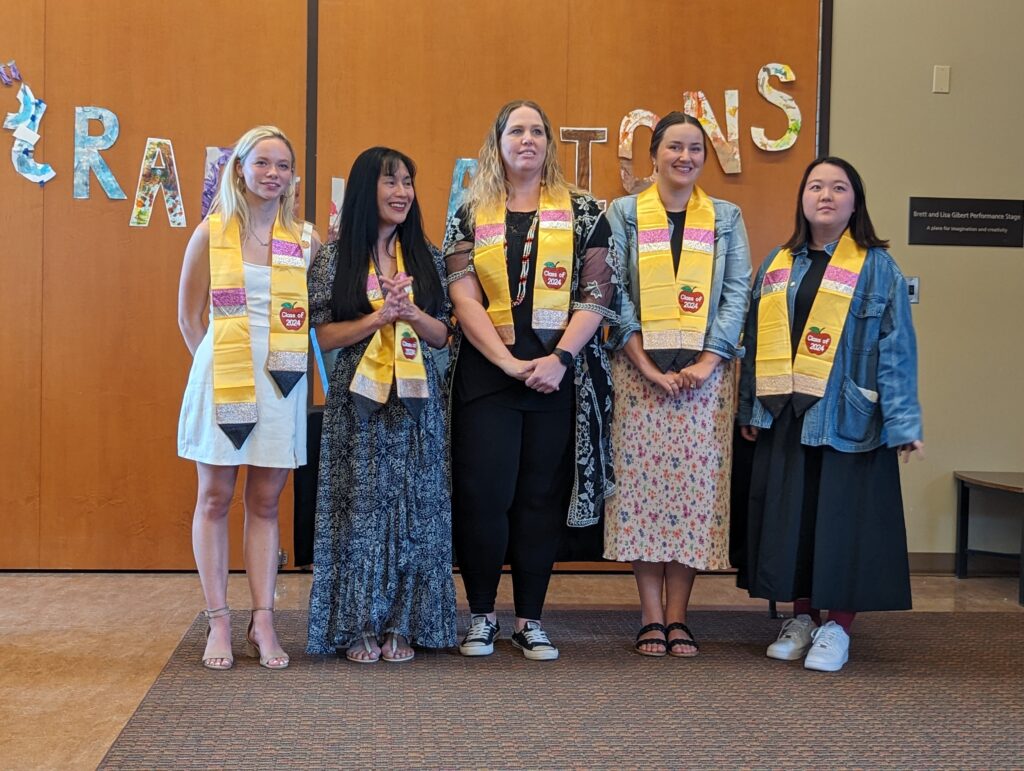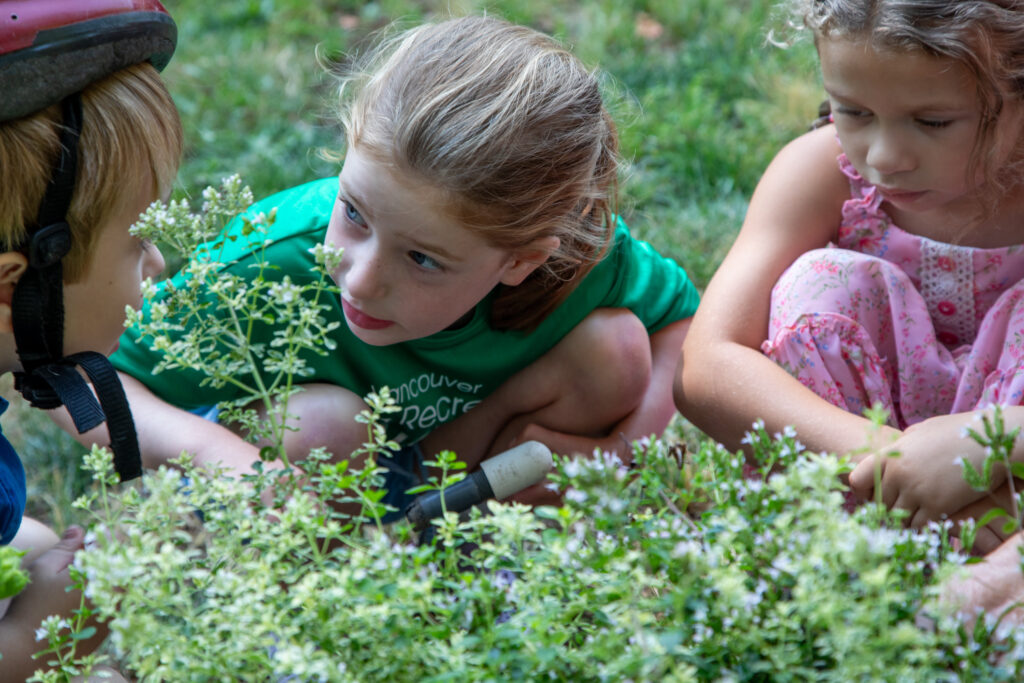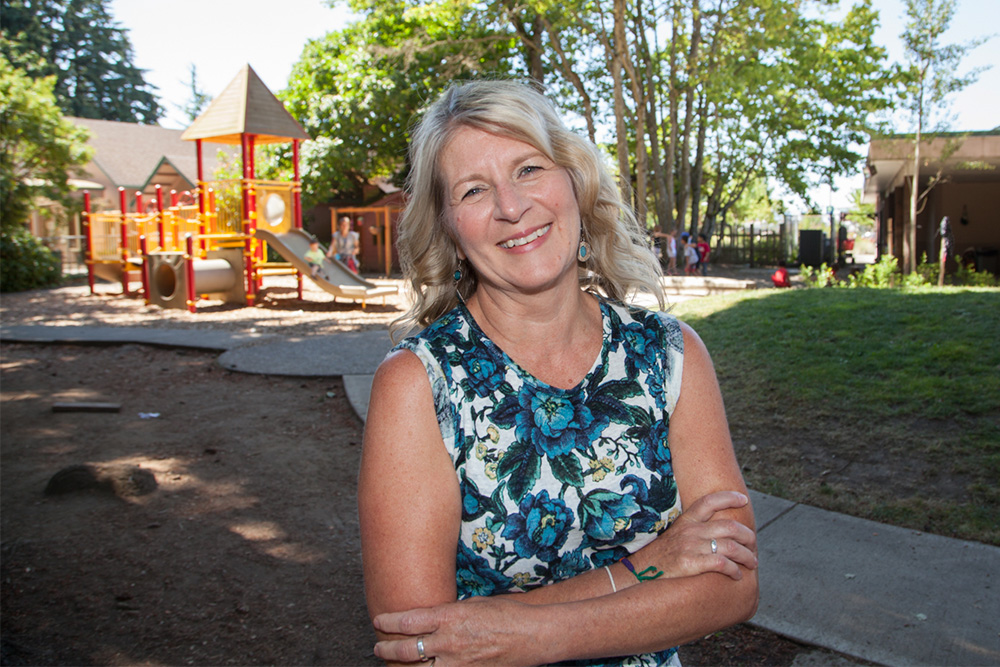This article was first published on Dr. Karin Edward’s LinkedIn profile. We have included a Q&A with Sarah Theberge, Clark College faculty for the Bachelor of Applied Science in Teacher Education and Early Childhood Education programs at the end of the article.

Please join me in congratulating Ami, Caroline, Emily, Olivia, and Tammy.
These five women comprise the first cohort of Clark College students to graduate from our new Bachelor of Applied Science in Teacher Education program. Our two-year BASTE program leads to certification in preschool through 8th grade and endorsements in bilingual education, special education, and early childhood special education.
Our first cohort represents a variety of student types. Some are recent high school graduates. Others completed high school decades earlier and have been busy working in other fields and raising families. But all were passionate about becoming teachers.
These graduates embody the promise Clark College made to our students and community: Provide a seamless pathway for the student who already has earned an associate of applied science degree to access a teacher education/certification degree that has:
- Affordable cost, so they can graduate with less debt
- The ability to immerse and connect in smaller cohorts
- Academic flexibility for working students
- A combination of evening, hybrid and online courses
- Ample hands-on experience in local classrooms
- Easily accessible and familiar campus
I am pleased that Clark College created a teacher training program that checked all those boxes.
Thanks to this new pathway to teaching, Ami, Caroline, Emily, Olivia, and Tammy are prepared to head into local classrooms, putting their skills to work as they begin their rewarding teaching careers.
Clark College is the only community college within 40 miles that offers a bachelor’s degree in teacher education. In fact, Clark College offers five Bachelor of Applied Science degree programs:
- Applied Management
- Cybersecurity
- Dental Hygiene
- Human Services
- Teacher Education

New pathways can help resolve teacher shortages
Our BASTE students can specialize in areas currently experiencing teacher shortages in Washington State, as reported by the Washington Student Achievement Council, including:
- Special education, including early childhood special education
- Elementary education, including early childhood education
- Bilingual education
Around our nation, the need for bilingual teachers is increasing. In Washington State public schools, 14.3% of students were English language learners during the 2023-2024 academic year. Locally in Clark County, our two largest school districts averaged 17.1% of English language learners in 2023-2024.
Our program reduces the cost burden for teachers
Having worked in education for my entire career, I know that people choose to become educators not to make a lot of money, but because they are passionate about helping students, impacting lives, and making a difference in their community. Teaching is a labor of love.
Students who complete our BASTE program in four years at Clark College can save more than $23,400 in tuition and fees compared to students who pursue a similar bachelor’s teaching program at four-year public universities. This can lead to less student debt, making it easier for graduates to start their new teaching careers.

Empowering new teachers to adapt and thrive
Our BASTE program trains future teachers to be adaptable and able to work with a variety of learning needs and abilities, just as they will encounter every day in their classrooms. We provide them with the most current education practices and real-world classroom experience so they can thrive in their careers.
Our second BASTE cohort of 17 students—more than three times larger than our first cohort—is on track to graduate in June 2025. This fall, we will welcome our third cohort. It is gratifying to consider how deeply our BASTE-trained teachers will impact the lives of their students, their students’ families, and their communities over their teaching careers.
I am reminded of this quote: “If you look behind every exceptional person, there is an exceptional teacher.” Dr. Stephen Hawking, the renowned theoretical physicist, said this in tribute to a teacher who inspired him.
Here is how Sarah Theberge, Clark College faculty for our BASTE and Early Childhood Education programs described watching our first cohort of BASTE students graduating: “It is such a gift to be able to offer this program, be a part of the design with the most dedicated team, and to see this fabulous first cohort walk across the stage knowing they are graduating from a program designed with equity at its roots. This ensures that elementary and middle school classrooms have teachers who are skilled and align with the community demographics more authentically.”
Learn more about the Bachelor of Applied Science in Teacher Education at Clark College here.
Q & A with Sarah Theberge

Q: Why did Clark College decide to offer the BASTE program?
ST: SBCTC (Washington State Board for Community and Technical Colleges) charged community colleges with the task of offering Bachelor of Applied Science degrees to meet the needs of career tech students. Our dean approached us with an opportunity to rise to this charge within our program and work toward teacher certification for students.
Q: What need did your department see that was not being offered in our community? How is the BASTE program meeting that need?
A Bachelor of Applied Science in Teacher Education would fill that gap in our community. When we presented this idea to various advisory boards, the support was overwhelmingly positive.
Q: What was the process for creating Clark’s BASTE program?
ST: We began that process in 2019 by exploring what other colleges have done, met with school districts to understand needs, and started the approval process that involved the college’s Board of Trustees, the Washington State Board for Community and Technical Colleges, and the Professional Educators Standards Board (PESB), which is the accrediting body of teacher preparation programs in Washington State.
Q: How is the BASTE program training and preparing educators to step into a teaching career and make a difference in their classrooms?
ST: This is my favorite question! There are some core values within the context of the program. The first being a pathway for Early Childhood Education (ECE) students that is affordable and accessible with equity and inclusion, including Power, Privilege & Inequity embedded in each course.
Our desire is to align with Grow Your Own Teacher initiatives, where the representation of teachers who match the demographics of the districts is primary to the program. We also have partnered with districts and have listened to and heard the needs they express for this representation. School districts want teachers able to work with a wide variety of learning needs and abilities. This is why we offer both the Early Childhood Special Education endorsement and the Elementary Education Special Education endorsement. In keeping in line with our equity and Power, Privilege & Inequity values, we also offer the Bilingual endorsement.
These endorsements serve to meet the needs of the skills teachers are to possess in our service area to serve the children and families in the classroom. In addition, these endorsements allow teachers to move within the buildings they are working to meet the needs of individual school objectives and goals.












